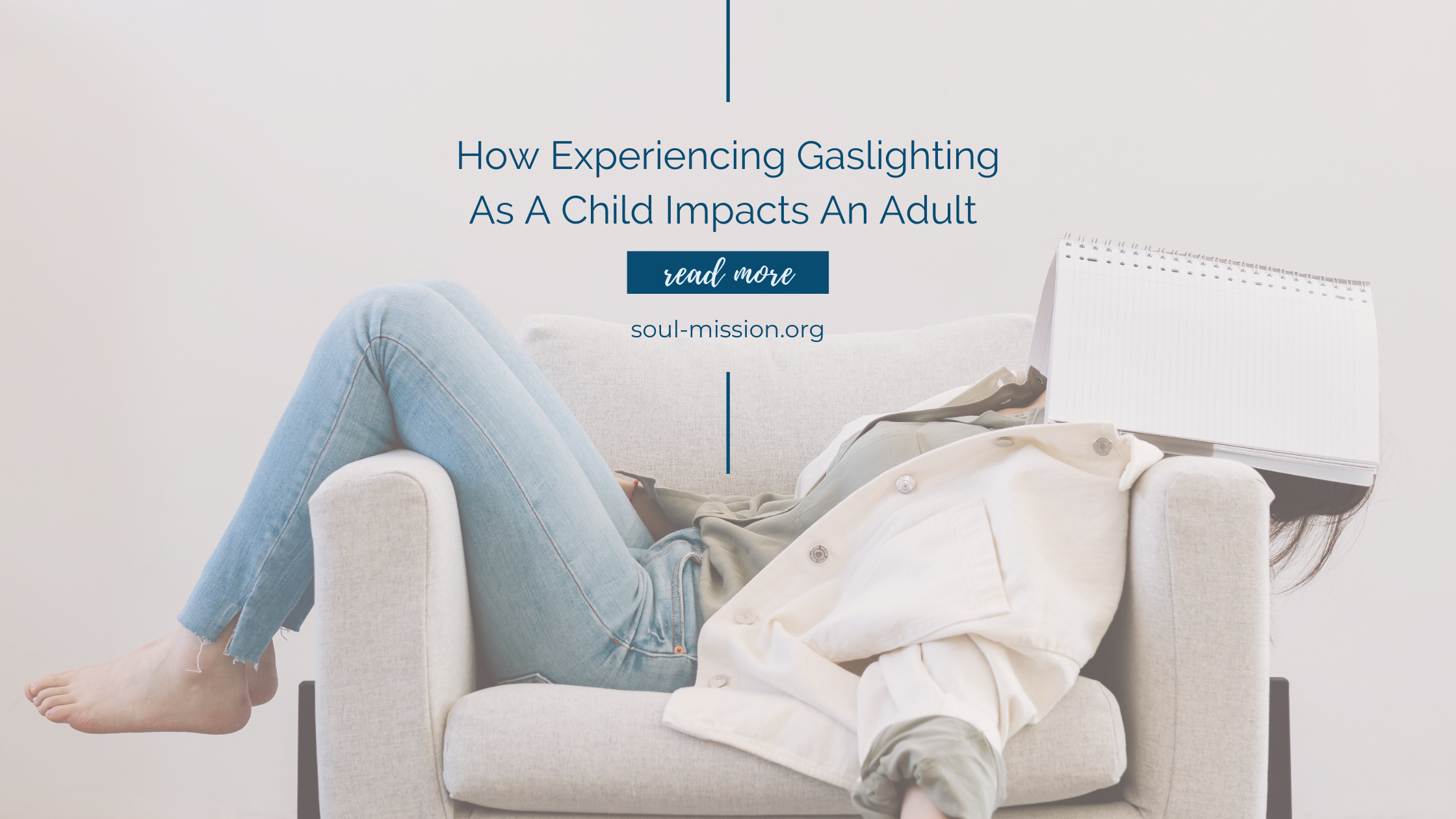How Experiencing Gaslighting As A Child Impacts An Adult
Person laying over sofa chair with legs over arms, notebook over face. Caption reads How Experiencing Gaslighting As A Child Impacts An Adult. Read More button Soul-mission.org
Gaslighting has become a hot topic as more people become familiar with it and potentially understand their experiences through this lens.
So what is gaslighting? Gaslighting is when one person manipulates the other in an attempt to cause them to question their thoughts, feelings, sanity, and reality. The term comes from the film Gaslight (1944), adapted from the play Gas Light (1938), in which a husband slowly manipulates his wife into believing she has lost her sense of reality. The film and play got the name from an instance in the story where the gaslights flicker due to the husband sneaking into and using the lights in the attic. When the wife notices the flickering and brings it up, the husband convinces her she must have imagined it.
Gaslighting can be an outright manipulative tactic, where someone is aware that what they do is an attempt to place power and control on another person. It can also be a part of generational trauma, passed from caregiver to child repeatedly until someone decides to break the cycle.
Signs of Experiencing Gaslighting in Childhood (Looking back as an Adult)
Looking back on your experiences and questioning your thoughts and feelings in that situation.
Remembering times when the caregiver twisted information
Memories of the caregiver always believing they were right, and if/when they did end up being wrong, there was never an apology.
Looking back on memories of having your feelings dismissed.
Remembering instances where the caregiver made it seem like they knew what you were feeling and what you needed better than you did.
Some of these can be applied to instances where a child is developing, and the parent is trying to get them to try something new. An example I've heard is, "You know you like broccoli. You love broccoli! Remember last week when you had broccoli, and it was the best?" This may seem like a silly example. I truly believe that looking at the motivation behind the statements and questions makes it easier to understand if it is gaslighting or something else. For example, if you compare the above statement about broccoli to "This is ridiculous! You like broccoli, and you've always liked broccoli. I'm just trying to be a good parent, and you're making me feel like the bad guy!" There's a different feel to each statement and different motivations behind each.
Examples of Gaslighting
Oh, it doesn't hurt that bad! You're fine.
Why are you always overreacting?!
You're still alive, aren't you?
You don't need to be in therapy. Nothing is wrong with you. You just need to take better care of yourself.
What I did for you was good for you. You should be grateful.
You're not understanding what I meant. That never happened.
If I did something mean, it was because I love you and want you to be better.
See, I helped you with all this stuff. I'm a good parent.
Why can't you be more like your brother, sister, cousin, etc.?
The Impact and What You Can Do
The impact of gaslighting can make someone feel like they are losing their grip on reality and question if what they are thinking or feeling is real. This can potentially lead a person to struggle with anxiety, depression, and self-esteem issues, and understandably so. It can be extremely difficult when the person who was supposed to love and teach you ends up being the person who furthered a cycle of invalidation and lack of support. AND the cycle of abuse does not have to continue. Here are some steps that can help you if you are struggling as an adult, realizing one or both of your caregivers may have used gaslighting in your relationship growing up.
Find support in people who validate your experiences and your emotions. By building this support network, you have multiple people you can go to if your caregivers' behavior causes you to second-guess or blame yourself.
Learn to own your feelings - every single one. This can be uncomfortable at times, but honoring your emotions is so vital after spending a lifetime hearing they were not valid.
Engage in therapy! I am biased in leaning toward therapy, but in all seriousness, it can be very helpful. Having someone to vent and talk to who can help piece apart some of the manipulations can be useful. EMDR therapy can also be beneficial in processing the trauma underlying the manipulation.
Thank you for reading my post! I hope you have found it beneficial. If you are looking for more information or would like to schedule a free consultation, please reach out today.

